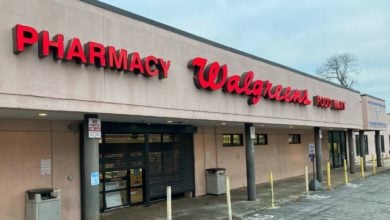On Sept. 10, the Atlanta Police Department vice squad raided and arrested eight employees of the Atlanta Eagle Club, a midtown gay bar. More than a dozen cops, some in plain clothes, demanded that the 62 patrons lay face down on the floor, some in handcuffs, as police conducted frisks and background checks on them before they were permitted to leave.
 Patrons and community members demonstrate in support of the Eagle, a local gay bar, following the bigoted police raid, Atlanta, Ga., Sept. 11. |
Patrons reported anti-gay and racist verbal abuse from the officers during the sweep.
“I am furious at how we were treated and can’t believe that this has happened in this day and age. The officers present were incredibly rude to anyone who dared to ask what was happening and several were openly hostile towards the gay patrons,” said Allan Vives, a patron in the bar during the raid.
“A lot of anti-gay comments were made,” said Du-Wayne Ray, the store manager of Rawhide Leather, a store that operates below the Eagle, who was also detained.
Ray said that he and another man heard a white uniformed officer say to another, “This is a lot more fun than raiding [racist epithet] with crack.”
The employees arrested at the Eagle were charged with “illegal operation without a license” and “absence of city dancing permit.” Six of the eight arrested remained in jail until all were released on the afternoon of Friday, Sept. 11.
The police claim the raid was in response to “alleged criminal conduct” at the bar and complaints from the neighbors. Steve Gower, a volunteer with a neighborhood watch group, reported the neighborhood group has not had any problems with the Eagle.
Neighbors in the apartment complex near the Eagle had signs in their windows in solidarity with the bar. One read, “We support the Eagle.”
No drugs were found during the raid, according to one of the bar owners, Richard Ramey.
Several actions show outrage
Several protests have taken place since the police attack. The night after the raid, people gathered along Ponce De Leon Boulevard and linked arms “to stand in solidarity and show our support for the establishment.” On Sunday, Sept. 13, a protest of more than 200 took place at the bar with many community leaders joining the rally.
“We will not stand for this. We will not be silent,” said Jeff Schade, an organizer of Sunday’s rally.
Many at the rally held signs from protests against Prop. 8 in California, apparently from other demonstrations that were held in solidarity with the mass action on the West Coast.
The following weekend, on Sept. 19, the protest was carried over to Atlanta City Hall, which drew about 100 demonstrators.
On the 40th anniversary of the Stonewall rebellion, the Rainbow Lounge in Fort Worth, Texas, was raided in a similarly aggressive fashion. Activists question whether the systematic harassment of LGBT establishments might continue to take place, especially in the South.
Role of the police in maintaining LGBT oppression
Some leaders in the community have made appeals to the Atlanta Police Department to foster a relationship between the LBGT community and the police. But despite the window dressing of an LGBT community liaison in the police department—who reported being unaware that the raid was to take place—part of the role of the police in capitalist society is to maintain the social order of continued harassment and oppression of LGBT people.
No training, no liaison, no appeal can change that basic relationship. For more than 40 years, the LGBT community has had to fight against the systematic harassment and brutality from the police. These are the same cops who help break strikes and defend the bosses and their property against workers’ demands.
The police help perpetuate bigotry and racism because these are wedges that divide working people. The only beneficiaries are those who profit from our labor; our disunity becomes their strength. The LGBT community can—and must—link with groups fighting racist police brutality and raids against undocumented workers. Uniting these struggles is essential for victory.
There is a true crime epidemic that must be addressed: the criminal role the police play in terrorizing communities in maintaining a racist, bigoted social order that puts profits before people. It is time to build a united movement against police raids, brutality and murder.






